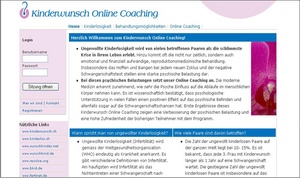Child Wish Online Coaching

- Description:
The Child Wish Online Coaching program is designed to improve the mental health of infertile couples, but increasing pregnancy rate is not a primary aim. The content of the program is primarily based on principles of cognitive behavioural therapy (CBT). Participation in the programs takes 10 weeks and requires a commitment of approximately 2 hours per week. The program consists of an interactive self-help guide, a module for you to establish regular email contact with a therapist, a continuous monitoring and feedback system examining your responses, and a forum where you have the opportunity to share experiences with other participants. The Child Wish Online Coaching program is currently under revision, but you can register to be put on a wait list.
- Service URL:
- http://www.kinderwunsch.online-therapy.ch
- Agency Responsible:
- Department of Clinical Psychology and Psychotherapy, University of Bern.
Details
- Format:
- Website.
- Intervention Type:
- Psychological – CBT.
- Course Length:
- Long (more than 5 modules). Comprises 10 weeks
- Support Option:
- Clinical support. Provided if requires
Target Audience
- Primary Category:
- Infertility. Targets psychological distress associated with childlessness
- Target Audience:
- Adult.
- Language:
- English. Delivered in German
Access
- Fee:
- Fee-based.
- Access:
- Closed: Fee required.
- Contact Details:
Research evidence
- Research Trials:
- 1
- Research RCTs:
- 1
- Outcome Summary:
One randomised controlled trial (RCT) has investigated the efficacy of the Child Wish Online Coaching program, but found that participants in the program did not experience any significant mental health improvements compared to participants in a wait-list control group. This study may have lacked statistical power to detect small to medium effect sizes. There were small between-group effect sizes which were in favour of the intervention group on all mental health measures, ranging from d = 0.16 to 0.38. These effect sizes are comparable to those of face-to-face psychological interventions for infertile individuals. Within-group improvements in the wait-list control group on all mental health measures attenuated between-group differences, which provides some explanation for the lack of significant between-group differences. The program did however significantly reduce the depression level of clinically distressed and depressed participants. Overall, this study provides weak evidence for the efficacy of the program.
- Recommended rating, reviewer 1:

- Recommended rating, reviewer 2:

Read more about Beacon's Smiley Rating System.
Research paper citations
Efficacy studies
- Haemmerli, K., Znoj, H., & Berger T. (2010). Internet-based support for infertile patients: a randomized controlled study. Journal of Behavioural Medicine, 33(2), 135-146.
Additional references
- Hämmerli, K., Znoj, H., & Berger T. (2009). Kinderwunsch Online Coaching - ein webbasiertes Selbsthilfeprogramm. Journal für Reproduktionsmedizin und Endokrinologie, 6(3), 111-115
User ratings
User ratings and comments are moderated in order to assure the quality of the submissions. It might take a week for your rating to show up.
Your rating
Login to rate this service.
Other user ratings
No ratings for this service yet.
Last Updated: December 15th 2010

 Home
Home
 Categories
Categories Infertility
Infertility